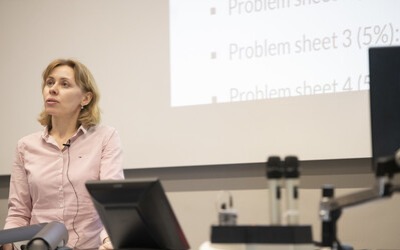Teaching and learning

A personalised student experience
All our degree courses offer a level of flexibility so that you can tailor your degree to the subjects that interest you most, meaning that you can have different experiences of teaching and learning during your time at The Department of Computer Science, Warwick.
All of our students have extended hours access to dedicated computing laboratories, each of which is equipped with high specification workstations and comfortable spaces for group work and collaboration. This is in addition to specialised hardware and software for student projects. We have specialist state-of-the-art equipment to support teaching in areas including computer graphics and high performance computing.
Our approach to teaching
Support
You will be allocated a dedicated Personal Tutor, an academic from within the department who you will be encouraged to meet on a regular basis. Your personal tutor can offer support and guidance for all matters relating to your academic progress or personal wellbeing. Our student Computing Society also offers academic and professional skills support through regular programming workshops, academic talks with industry professionals as well as hosting gaming and other social events.
Teaching
Our courses offer a balance of core material delivered through lectures, small-group seminars, and hands-on laboratory sessions. Lectures are large group lessons in which an academic will speak for usually around an hour on a particular subject. Seminars offer an often complimentary smaller group session where you will have a chance to build on topics introduced in lectures, while laboratory sessions provide opportunities to apply your learning and develop your practical skills under the support of supervision staff.
Assessment
Your performance on most modules will be assessed by a combination of coursework and written examination. The coursework may be individual or group work involving programming, research, writing, and/or presentations. Typically in the third and fourth years of some of our courses, depending on which degree path you follow, project work is fully assessed by a presentation and project reports.
Quick links

Student blogs
We have dedicated students who blog about their experience studying at The Department of Computer Science.
Read more about how our students manage their studies day-to-day, tips on revision, and how to prioritise deadlines.

Computer Science careers
After graduation, 97% of our graduates go into employment within 6 months.*
The department is 3rd in the UK with an average salary of £46,800 for graduate earnings, five years after graduation.**
*The HESA destinations of leavers from higher education survey 2016/17
**2018 longitudinal education outcomes dataset

Leading academics
Take a look at some of the exciting research our academics are working on to get an idea of the challenges and progress being made in the sector right now.
